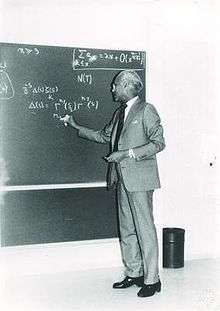K. S. Chandrasekharan
Komaravolu Chandrasekhar (21 November 1920 – 13 April 2017)[1] was a professor at ETH Zurich[2] and a founding faculty member of School of Mathematics, Tata Institute of Fundamental Research (TIFR). He is known for his work in number theory and summability. He received the Padma Shri, the Shanti Swarup Bhatnagar Award, and the Ramanujan Medal, and he was an honorary fellow of TIFR. He was president of the International Mathematical Union (IMU) from 1971 to 1974.
Komaravolu Chandrasekhar | |
|---|---|
 | |
| Born | 21 November 1920 |
| Died | 13 April 2017 (aged 96) Zurich |
| Citizenship | Indian-Swiss |
| Alma mater | Madras University |
| Known for | Administrative intellect, Mathematics, Analytic Number Theory and Mathematical Analysis |
| Awards | Srinivasa Ramanujan Medal (1966), Padma Shri (1959), Shanti Swarup Bhatnagar Award for Mathematical Sciences (1963) |
| Scientific career | |
| Fields | Number theory |
| Institutions | TIFR, ETH Zurich |
| Doctoral advisor | K. Ananda Rau |
| Doctoral students | C. S. Seshadri M. S. Narasimhan |
Biography
Chandrasekhar was born on 21 November 1920 in Machilipatnam in modern-day Andhra Pradesh. Chandrasekhar completed his high school from Bapatla village in Guntur from Andhra Pradesh. He completed his M.A. in mathematics from the Presidency College, Chennai and a PhD from the Department of Mathematics, University of Madras in 1942, under the supervision of K. Ananda Rau.[1]
When Chandrasekhar was with the Institute for Advanced Study, Princeton, US, Homi Bhabha invited Chandrashekhar to join the School of Mathematics of the Tata Institute of Fundamental Research (TIFR). Chandrashekhar persuaded mathematicians, such as L. Schwarz and C. L. Siegel, from all over the world to visit TIFR and deliver courses of lectures. In 1965, Chandrasekhar left the Tata Institute of Fundamental Research to join the ETH Zurich,[1] where he retired in 1988.[3][4]
In 2012 he became a fellow of the American Mathematical Society.[5]
Selected works
- with Salomon Bochner: Fourier Transforms. Princeton University Press. 1949.[6]
- with S. Minakshisundaram: Typical means. Oxford University Press. 1952.[7]
- Introduction to analytic number theory. Springer. 1968.[8] reprinting 2012
- Arithmetical Functions. Grundlehren der Mathematischen Wissenschaften. Springer. 1970.[8]
- Elliptic Functions. Springer. 1985.
- Classical Fourier transforms. Springer-Verlag. 1989.
- Course on topological groups. Hindustani Book Agency. 2011.
Notes
- "Some Famous Indian Scientists" (PDF). Mumbai, India: Tata Institute of Fundamental Research, Science Popularisation and Public Outreach Committee. 14 November 2004. p. 12. Retrieved 26 May 2009.
- Komaravolu Chandrashekhar
- "Department of Mathematics Retired Faculty". Eidgenössische Technische Hochschule Zürich. 4 February 2005. Retrieved 26 May 2009.
- "ETHistory Selbstständige Professuren" (in German). Eidgenössische Technische Hochschule Zürich. 2005. Archived from the original on 13 June 2011. Retrieved 26 May 2009.
- List of Fellows of the American Mathematical Society, retrieved 10 November 2012.
- Segal, I. E. (1950). "Review: Fourier transforms, by S. Bochner and K. Chandrasekharan" (PDF). Bull. Amer. Math. Soc. 56 (6): 526–528. doi:10.1090/s0002-9904-1950-09436-1.
- Kuttner, B. (1954). "Review: Typical means, by K. Chandrasekharan and S. Minakshisundaram" (PDF). Bull. Amer. Math. Soc. 60 (1): 85–88. doi:10.1090/s0002-9904-1954-09760-4.
- Stark, H. M. (1971). "Review: Introduction to analytic number theory, by K. Chandrasekharan; Arithmetical functions, by K. Chandrasekharan; Multiplicative number theory, by Harold Davenport; Sequences, by H. Halberstam and K. F. Roth" (PDF). Bull. Amer. Math. Soc. 77 (6): 943–957. doi:10.1090/S0002-9904-1971-12812-4.